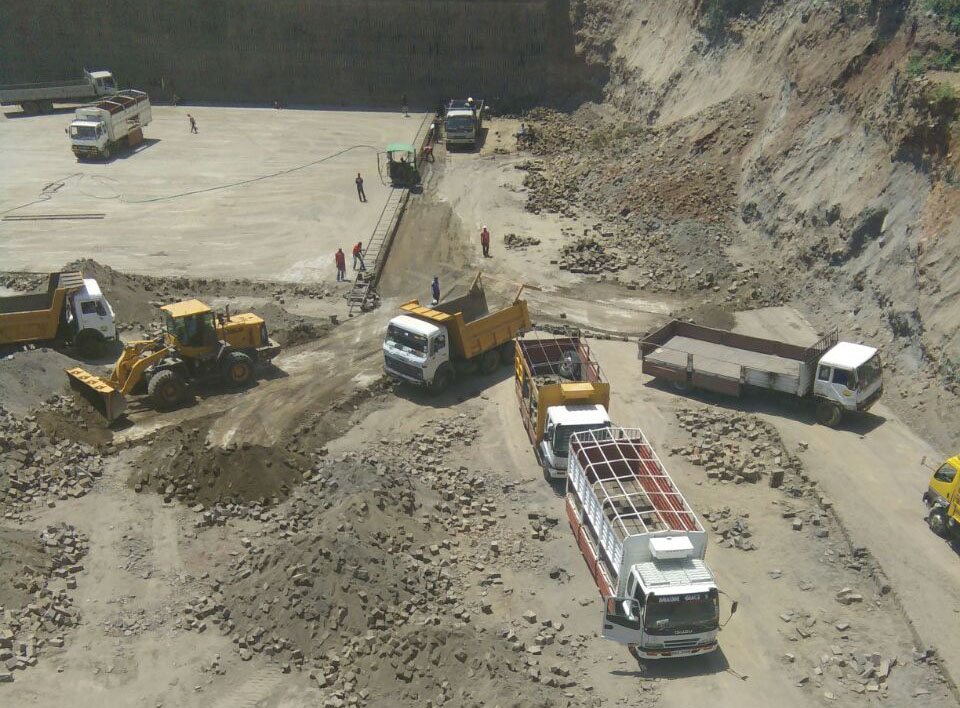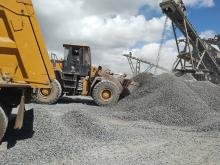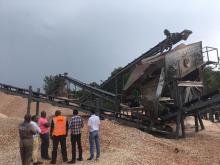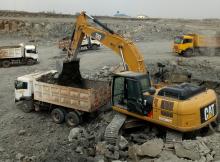
Kenyan construction firms are struggling to survive after Chinese rivals entered the domestic market. Is this a long-term issue and does it have more wide-reaching implications for the East African construction sector as a whole? Shadrack Kavilu reports.
Kenyan construction firms are raising alarm over the entry of state-funded Chinese engineering firms in to the private domestic construction sector. China’s increasing influence on infrastructure in East Africa has undoubtedly helped governments improve public infrastructure and drive their economic growth.
Over the last decade, Chinese construction companies have won mega public infrastructure projects in the region where poorly-maintained infrastructure is viewed as a barrier to economic development.
A report on Africa’s infrastructure by auditing and consulting firm Deloitte shows that China is the most visible builder of East Africa projects being involved with 41% of the total in 2016.
But while Chinese companies work on public infrastructure has spurred economic development, their increased foray into the private construction segment is driving local firms out of business.
The East African region has enormous growth potential for the construction industry, fuelled by rapid urbanisation and increasing demand for new housing units.
Deloitte’s latest ‘Africa Construction Trends’ report states that East Africa is home to 15% of construction projects in Africa, worth a combined US$ 27.4 billion in 2016.
Local construction companies were involved with 25.6% of such mega projects last year.
In Kenya, like other East African countries, Chinese companies have dominated almost every mega public infrastructure project. Their ability to complete projects on time and their high quality work has seen them win admiration from both the private and public sector.
But the Chinese companies are also aggressively seizing opportunities in the commercial and private real estate segment, edging out locally-owned construction firms.
Since their entrance into the market a decade ago, several big domestic companies have closed shop owing to the stiff competition, superior machinery and lower bids for lucrative state tenders.
Firms such as Kundan Singh, Spencon Holdings and Mugoya Construction have ended up in receivership with hundreds of job losses and billions of Kenyan shillings worth of bad debts.
A recent survey conducted by Central Bank of Kenya (CBK) found that 15 local banks had tightened credit standards for construction companies due to the rising incidence of bad loans in the sector, an indication of the dire strain on the local construction firms.
Other local construction firms such as H Young and Intex Construction have since resorted to forming consortia with European and Indian conglomerates when bidding for government tenders.
While the big companies have devised means to survive the onslaught, small and medium domestic construction firms are feeling the heat of Chinese diversification into private infrastructure projects.
Initially the local construction firms didn’t view the Chinese as a potential threat, given their appetite for large-scale mega infrastructure projects. This had allowed local construction firms to focus on real estate, aggregates mining and property investments.
However their recent increasing diversification into commercial real estate and the property sector is driving out a significant number of locally-owned construction companies who can’t keep pace with their advanced technology.
“It is disturbing to see Chinese firms with their heavy state-of-the-art machinery allowed to venture into raw material supply such as stone quarry mines, crushing of rock stones and ballast,” says Duncan Mwangi, a contractor who owns a stone quarry mine adjacent to a Chinese one in Joska, some 30 kilometres east of Kenya’s capital, Nairobi.
“We are actually struggling to maintain our clients, we only have one machine-cut compared to our Chinese competitors here who have deployed 4 machine-cuts,” says Mwangi, adding that most clients prefer the Chinese quarry since they don’t have to wait for long hours before loading.
Kenya’s real estate market has great potential because rapid urbanisation has created a huge need for housing units. The demand has provided an opportunity for Chinese companies to venture into the sector to bridge the supply gap.
The heavy presence of Chinese companies in commercial real estate is so obvious that their construction projects dot Nairobi’s sky line, an indication that local construction companies are headed for turbulent times.
In the recent past, several Chinese firms have won private contracts to construct some of the tallest commercial buildings in the city, such as KCB Plaza which was constructed by China Wu Yi. Early this year, Hass Petroleum group contracted China State Construction Engineering Corporation (CSEC) to construct a 67-floor building in Nairobi’s Upper Hill district.
Other Chinese companies that have undertaken commercial buildings include China Jiangxi International, which has constructed several commercial buildings in the city.
To have a better footing in the market, China Wu Yi has built a $100 million housing materials plant in Nairobi for its own use as well as to sell raw construction materials to the local market.
Players in the industry argue that the setting up of manufacturing plants by the Chinese companies and their foray into the real estate sector will weaken domestic contractors who have been supplying these materials, an aspect overlooked by government when consenting to and awarding contracts.
China’s entry into real estate is rapidly changing the country’s construction landscape. Today, the majority of quarry stone sites, stone crushing and aggregate mines are owned by Chinese companies- a sector once widely seen as the reserve of local construction firms.
“We initially thought Chinese companies would be confined to the big projects. Unfortunately they have taken over the entire construction value chain, locking out domestic contractors,” said Alex Kamore, a local contractor who has since switched to farming.
“It has proven difficult to rely on construction. The Chinese have consolidated the entire supply chain, from providing raw materials, mapping, designing, building, painting, electrification and even air conditioning, completely locking out local contractors,” said Kamore.
Kenyan contractors blame the government for providing incentives to Chinese companies such as special and general tax breaks, and favourable import and export terms which have given them a competitive edge over local construction firms.
“You can’t compete with these Chinese on an equal platform. They have access to very low cost capital and operate with a longer repayment period compared with our local firms who have to work with commercial banks which attract high interest rates and shorter repayment periods,” observes Kamore.
Players in the industry argue that while governments in Africa are desperate to attract foreign investors and diversify their traditional sources of funding from the IMF, World Bank and Western governments, policies should be put in place to protect domestic construction firms.
“Proper policies should be put in place to protect nascent and locally-owned construction firms if we are to remain competitive in the advent of Chinese companies,” says engineer Onesmus Gichwiri, chairman of Kenya Joint Building Council (JBC).
Gichwiri notes, however, that though Chinese companies have diversified into private projects, they have cut out middle men and made construction materials cheaper.
The government has largely overlooked the implications of such funding on the local construction firms.
“It’s no doubt this funding is destroying domestic construction firms and unless we come up with policies to safeguard and promote the local construction industry it will harm the local industry,” says Gichwiri.
But according to the National Construction Authority (NCA), a Kenyan government organisation regulating the construction industry, Kenya has put measures in place to ensure that local contractors benefit from contracts won by Chinese firms.
“Under the new law, foreign firms would be required to ensure that a minimum of 30 per cent shareholding of their local operations go to local contractors,” said Daniel Manduku, NCA’s chief executive director.
The NCA argues that at least 30% of the monetary value of any project awarded to a foreign contractor should also go to locals.
It will be interesting to see whether the NCA measures are adhered to, and, if not, how the Kenyan and wider East African construction sector will look in a decade’s time.









